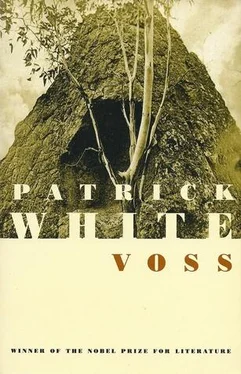As the hoofs of the horse ridden by Angus spattered away into the darkness, Mr Sanderson stood on the steps of the house with a lantern to guide his other departing guest to the gate. Of the rest, only Voss and Palfreyman were with him, for Le Mesurier, by some radiant discovery of vocation, was helping their hostess carry sleeping children to their beds.
Now Palfreyman, who had been silentest of all those present since his weakness wrested him from their company earlier in the evening, was looking at the stars, and said:
‘I am glad that my knowledge of astronomy is very poor.’
‘Why so?’ asked Voss.
‘To understand the stars would spoil their appearance.’
Voss snorted for the defencelessness of such a statement, which might permanently prevent him from taking Palfreyman into account.
Yet the German himself appreciated a poetry of the stars, as did each of the other men, a different one. It was the simplicity, hence the ridiculousness, of Palfreyman’s words that caused Voss inwardly to rage, and those stars at which he happened to be staring, to flash with cold fire.
‘There will be frost again tonight,’ shivered Sanderson, and the lantern shook.
‘Are you all right then, sir?’ asked Judd, lowering his voice, and touching Palfreyman on the elbow.
‘Why, yes, I was never better,’ said Palfreyman, who had forgotten his earlier indisposition.
The two men were speaking for each other, so the tone of their voices suggested. Something, Voss realized, had been established between them.
Then he almost experienced a state of panic for his own isolation — it was never to him that people were saying good-bye — and he had come down another step in an attempt to see what was in the faces of the convict and the ornithologist.
If he had but known, Palfreyman was remembering how, earlier that evening, the convict had brought him a shallow iron basin of water, and a lump of crude, yellow soap, and although this humble man had waited on him, they had gratefully sensed they were equal in each other’s eyes.
Now Voss, looking from one to the other, was trying to trap their shy secret, but could not succeed. There was a flickering of light, of willow trees.
In consequence, he said, with rather too anxious a warmth:
‘Good-bye, Mr Judd. I will come in search of you one day. Before we leave. I would see your land.’
But the emancipist murmured, and got upon his horse, and went.
Why, then, have I been foolish? the German asked himself; no man is strong who depends upon others. And as he went inside, he thought of the contempt he bore Palfreyman.
He has been rubbed up again in some way, Sanderson saw, as they were saying good night.
Indeed, Voss was scarcely present at any of that ceremony, nor saw the face of his host, who went away at last to his own room.
‘Do you think Mr Voss will be able to endure the sufferings of an explorer?’ asked his wife, who was brushing her hair by candlelight.
‘He subjects himself continually to such mental suffering, he well may,’ the husband answered.
‘But a great explorer is above human suffering, for his men’s eyes, at least.’
‘That is where he may come to grief. Not that his suffering is human. But other men will interpret it as such.’
‘I fear he may be ill,’ Mrs Sanderson ventured.
She came and laid her cheek against her husband’s. That others did not share the perfection of their life would fill her at times with a sense of guilt, and now especially was she guilty, by such golden light.
‘Have you been watching him to that extent?’ laughed her husband.
‘It is not necessary to watch. One can feel it. I wish it were possible to heal him.’
‘Rocks will not gash him deeper, nor sun cauterize more searingly than human kindness,’ said her husband with affectionate sententiousness.
Going to bed in the best room the Sandersons could offer, between exquisitely clean sheets and a lingering scent of verbena, Voss was not long with his body, and those thoughts which had been buzzing like blowflies in his head. At once the hills were enfolding him. All that he had observed, now survived by touch. So he was touching those same hills and was not surprised at their suave flesh. That which would have been reprehensible, nauseating, frightening in life, was permissible, even desirable, in sleep. And could solve, as well as dis-solve. He took the hand to read it out aloud, whatever might be printed on it. Here there were hills, too. They would not be gone around. That is the hill of love, his voice said, as if it had been most natural. That, she pointed, was burnt in the fire of the kiln as I pushed the clay in, and, insignificant though it is, will show for life. Then, roughly, he threw away the hand, which broke into pieces. Even in dreams he was deceived by the appearance of things, and had taken the wrong hand. Here it is, she said without grudge, and brought him another, which had not been baked. It was of white grain. It still had, most terribly, most poignantly, its semblance of flesh. So he shut it up in his bosom. He was afraid to look at it again. Till she bent down from her horse. The woman with the thumping breasts, who had almost got trampled, and whose teeth had been currying black horsehair, began to shout: Laura, Laura. For assistance. All that happens, happens in spite of the horsehair woman, who is, in fact, stuffed. Laura is smiling. They are sharing this knowledge. Then, how are names lost, which the hands have known by touch, and faces, like laborious, raw jugs? Laura is the name. But the name, all is lost, the veil is blowing, the wind. Is it not the same stuff with which the hills are shrouded, and of which the white word is, ach, Musselin, natürlich , but what else?
In the grey light and first house-sounds, Voss woke and lay with his face against the pillow, whose innocent down was disputing possession of him with the day. For a while the man lay there, trying to remember what he had dreamt, but failing. Irritated at first, he then remembered that it is enough to have dreamt. So he continued to lie, and the faded dream was still part of him. It was, he sensed, responsible for the state of complete well-being which possessed him, at least for that hour.
Sanderson himself brought a jug of hot water, and stood it in the basin. It pleased him to wait upon his guests in small ways, once he had learnt that this is the true way. But he did not address the German, as it was still too early. At that hour of day words might defile the pure pleasure of living.
Voss lay and listened to the people of the house begin to go about their business. Some of the girls were exchanging the plain, country dreams they had dreamt. They were giggling, and slapping, and protesting, until their mistress hushed them, and told them to bring brooms and buckets. The man heard the scratch and slop from these utensils as industry increased. He heard the methodical skirts of the mistress ever passing in the passage.
During the days which followed, the healing air of Rhine Towers worked upon Voss almost to the extent his hosts would have wished. In company with the amiable Mr Sanderson, he rode slowly about the paddocks, inspecting horses, mules, and a few head of cattle that they would take North for their requirements. (Additional beasts, a mob of sheep, and a herd of goats were awaiting them on the Downs, at Mr Boyle’s.)
While their leader was thus engaged, other members of the party were occupied in different ways: mending their clothes, writing in their journals, snoozing, casting flies for fish, chewing the long juicy grass, or yarning to the hands and Mrs Sanderson’s disbelieving maids. When Voss appeared, however, they would jump to it, eager to obey what now seemed to them his perfectly reasonable commands. All responsibility was taken from them by his presence, a fact of which they were most appreciative at this stage. They did not have to think, but could screw up their eyes at the sun. He was the leader.
Читать дальше












